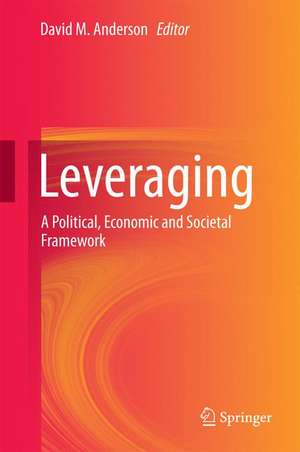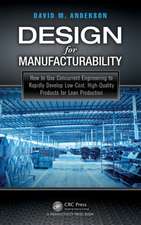Leveraging: A Political, Economic and Societal Framework
Editat de David M. Andersonen Limba Engleză Hardback – 26 iun 2014
| Toate formatele și edițiile | Preț | Express |
|---|---|---|
| Paperback (1) | 636.80 lei 6-8 săpt. | |
| Springer International Publishing – 17 sep 2016 | 636.80 lei 6-8 săpt. | |
| Hardback (1) | 643.00 lei 6-8 săpt. | |
| Springer International Publishing – 26 iun 2014 | 643.00 lei 6-8 săpt. |
Preț: 643.00 lei
Preț vechi: 756.47 lei
-15% Nou
Puncte Express: 965
Preț estimativ în valută:
123.05€ • 133.62$ • 103.36£
123.05€ • 133.62$ • 103.36£
Carte tipărită la comandă
Livrare economică 22 aprilie-06 mai
Preluare comenzi: 021 569.72.76
Specificații
ISBN-13: 9783319060934
ISBN-10: 3319060937
Pagini: 197
Ilustrații: XXIII, 197 p. 3 illus. in color.
Dimensiuni: 155 x 235 x 20 mm
Greutate: 0.49 kg
Ediția:2014
Editura: Springer International Publishing
Colecția Springer
Locul publicării:Cham, Switzerland
ISBN-10: 3319060937
Pagini: 197
Ilustrații: XXIII, 197 p. 3 illus. in color.
Dimensiuni: 155 x 235 x 20 mm
Greutate: 0.49 kg
Ediția:2014
Editura: Springer International Publishing
Colecția Springer
Locul publicării:Cham, Switzerland
Public țintă
ResearchCuprins
Part One: A Leverage Framework.- Introduction.- Part Two: Leverage and the Economy.- The Evolution of Real Estate Leverage.- The "Overleveraged" Crisis of 2008 from the Standpoint of Keynes's Monetary Theory of Capitalism.- China Leveraged the West to Grow Its Economy and Its Comprehensive National Power.- Part Three: Leverage and Politics: Domestic, State, and International.- The Morality of Leverage and the Leverage of Morality.- Leveraging Public Judgment.- Leverage in a Labor Management Relationship: Maximizing the Use of Leverage by Finding a Constructive Leverage Mean.- Leverage and the Regulatory Process.- The Advantages and Pitfalls of Leveraging Hunitarian Development and Diplomacy Towards National Security.- Part Four: Leverage and Social Relations.- Leveraging in Modern and Contemporary Families.- From the Leverage Ethic and Leverage Mean to a National Paid Parental Leave Policy.- Part Five: Next Steps.- Next Steps.
Recenzii
“This book has introduced the leverage mean concept and developed a leverage framework to analyse a wide range of economic, social, and political issues. … The book is quite philosophical and could be an eye-opener for many academics. The approach is innovative and results are appealing and interesting. It is very useful in motivating us to think about many social or political issues from a new angle for a better and deeper understanding.” (Steven Li, Economic Record, Vol. 92 (296), March, 2016)
Notă biografică
David M. Anderson is Senior Vice President, State Relations, at The Washington Center for Internships and Academic Seminars. He has taught at The George Washington University, the University of Cincinnati, and Johns Hopkins University.
Textul de pe ultima copertă
Leveraging, according to David M. Anderson and his colleagues, is both a basic principle of human conduct and the most dominant strategy in recent years that individuals, organizations and countries use to pursue their ends. Although many scholars agree that a crisis of “over-leveraging” caused the financial crisis of 2008-2010, it has not been appreciated that an “over-leveraging” crisis has existed in American politics and the American family system as well. This book addresses the need for a “Leverage Mean” (falling between the extremes of too much leverage and too little leverage) in the economy, politics, family life, and international relations. It identifies three different kinds of leveraging—bargaining, resource, and investment and provides an explanatory and normative theory which draws on the fields of economics, political science, sociology, history, psychology, international relations, law, and philosophy. Moreover, it shows how the dissolution of the Cold War, the dismantling of the modern family, and the rise of the Internet along with the deregulation of the financial services industry led to the diffusion of power which has made leveraging of the first importance for everyone. This book should be of interest to social scientists, philosophers, political theorists, public policy makers and politicians.
David Anderson and his colleagues are the first to characterize and assess one of the major instruments of power of the contemporary era. This volume represents the best work on leverage since Archimedes and will be widely read and discussed.
Benjamin Ginsberg, David Bernstein Professor of Political Science and Chair, Center for Advanced Governmental Studies, Johns Hopkins University
Leverage might literally be the operative word of the 21st century. Anderson‘s volume is a wide-ranging and illuminating study of this fundamental and dynamic concept.
Parag Khanna, Senior Fellow, New Amer
ica Foundation, author of The Second World: How Emerging Powers Are Redefining Global Competition in the Twenty-first Century
David Anderson and his colleagues are the first to characterize and assess one of the major instruments of power of the contemporary era. This volume represents the best work on leverage since Archimedes and will be widely read and discussed.
Benjamin Ginsberg, David Bernstein Professor of Political Science and Chair, Center for Advanced Governmental Studies, Johns Hopkins University
Leverage might literally be the operative word of the 21st century. Anderson‘s volume is a wide-ranging and illuminating study of this fundamental and dynamic concept.
Parag Khanna, Senior Fellow, New Amer
ica Foundation, author of The Second World: How Emerging Powers Are Redefining Global Competition in the Twenty-first Century
Caracteristici
Examines the role of bargaining leverage, resource leverage and investment leverage across societal sectors Investigates the role of leverage in the economic crisis of 2008-09 and in the broader context of the theory of capitalism Discusses the risk and theory behind over-leveraging in both economic and political contexts Includes supplementary material: sn.pub/extras









